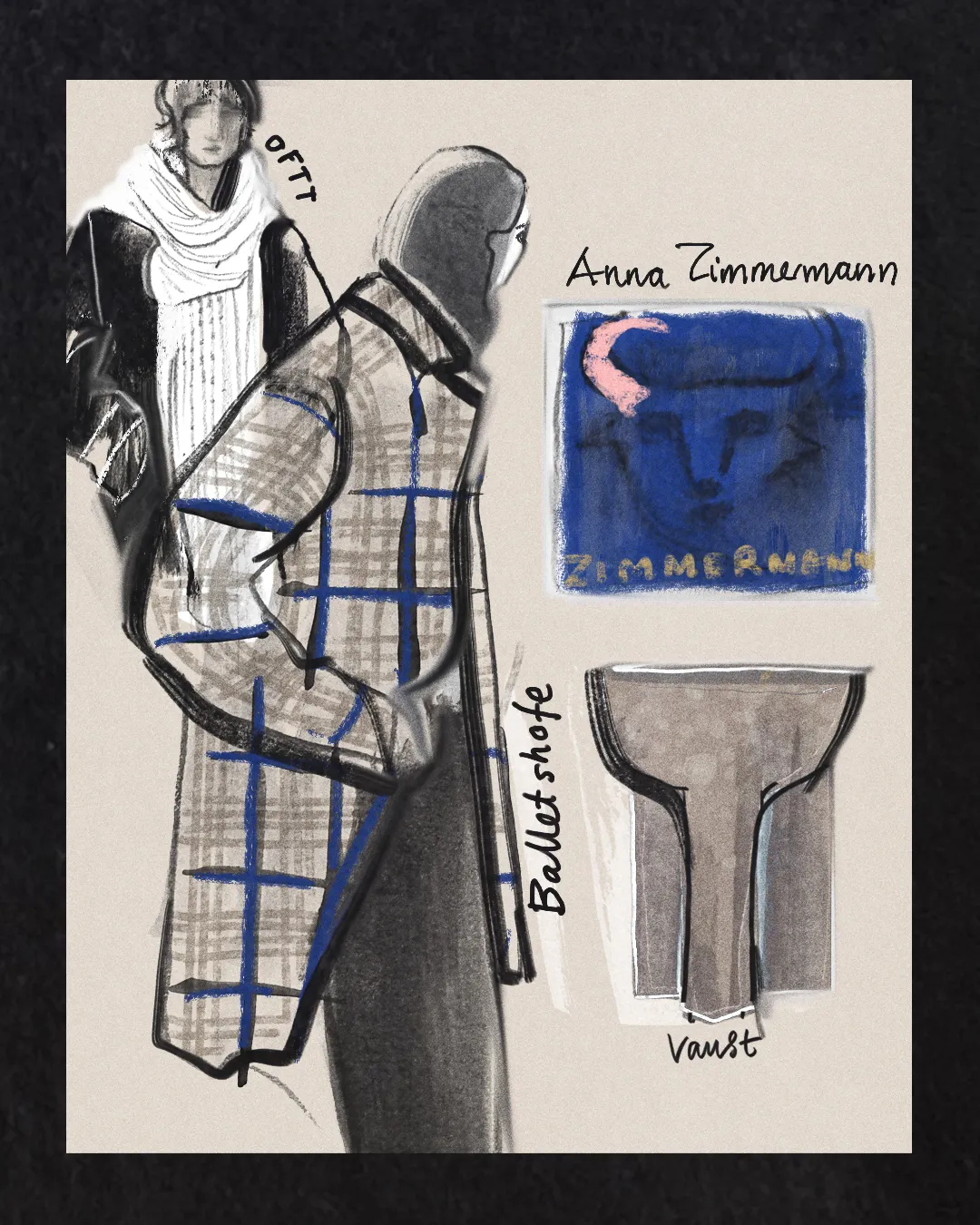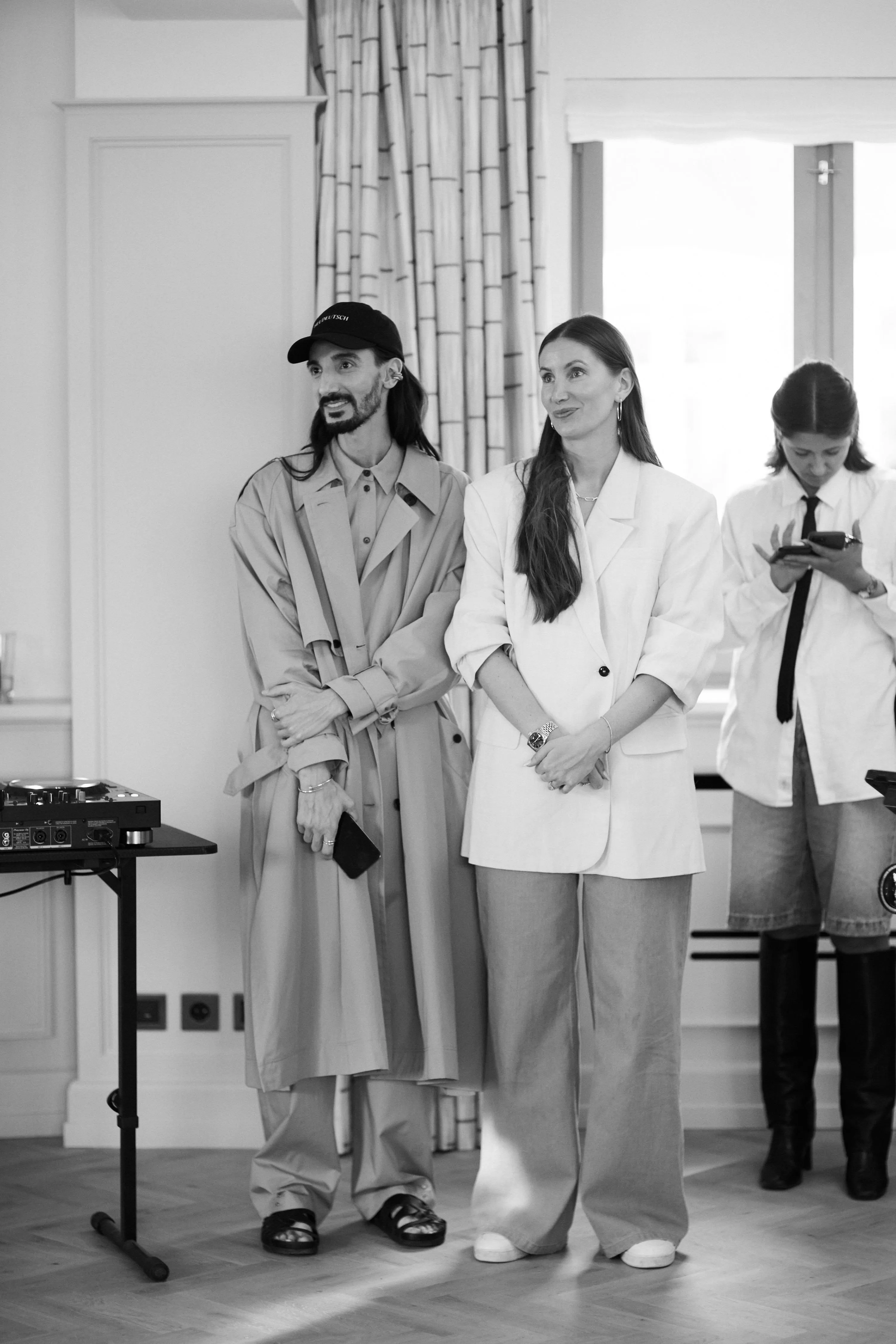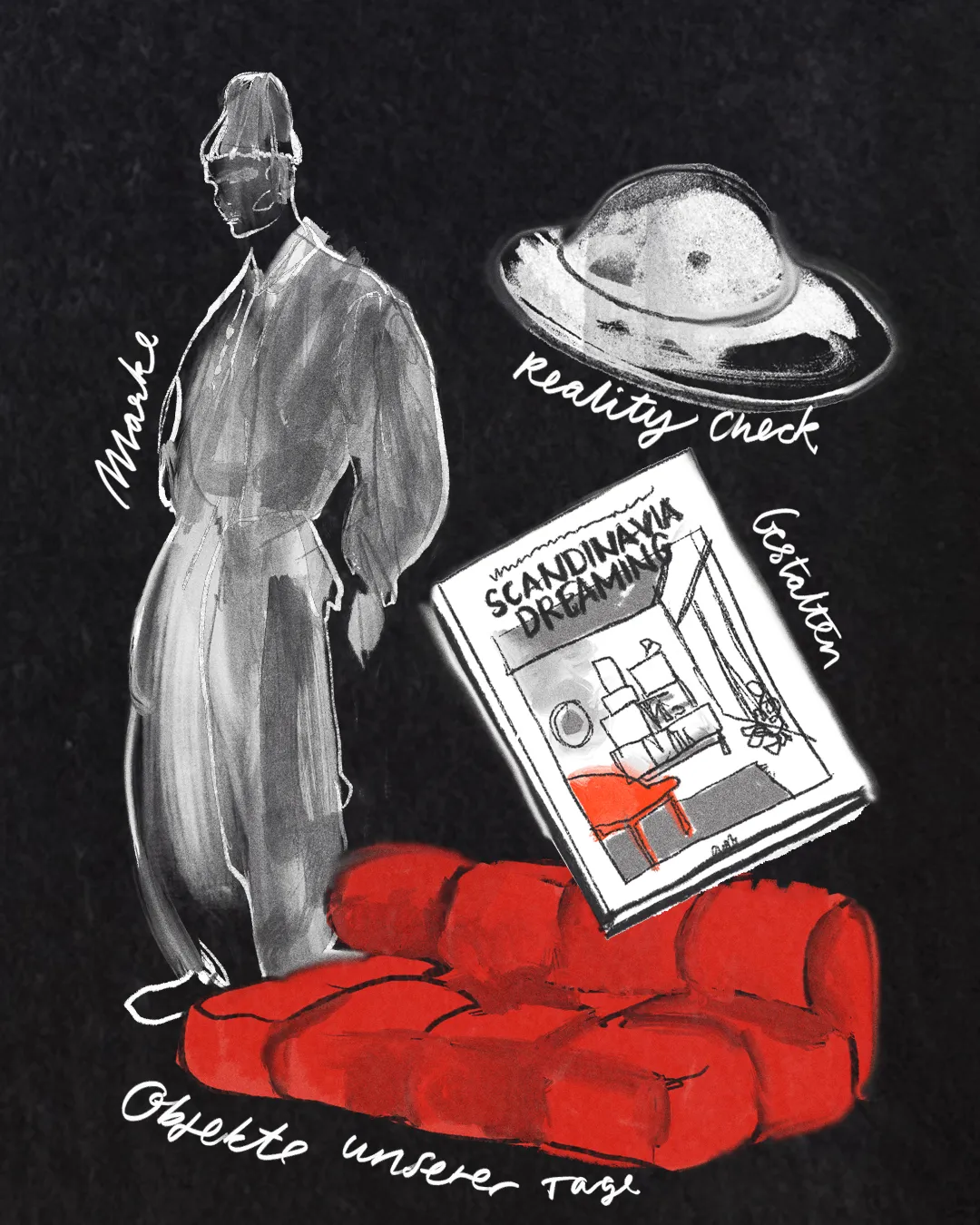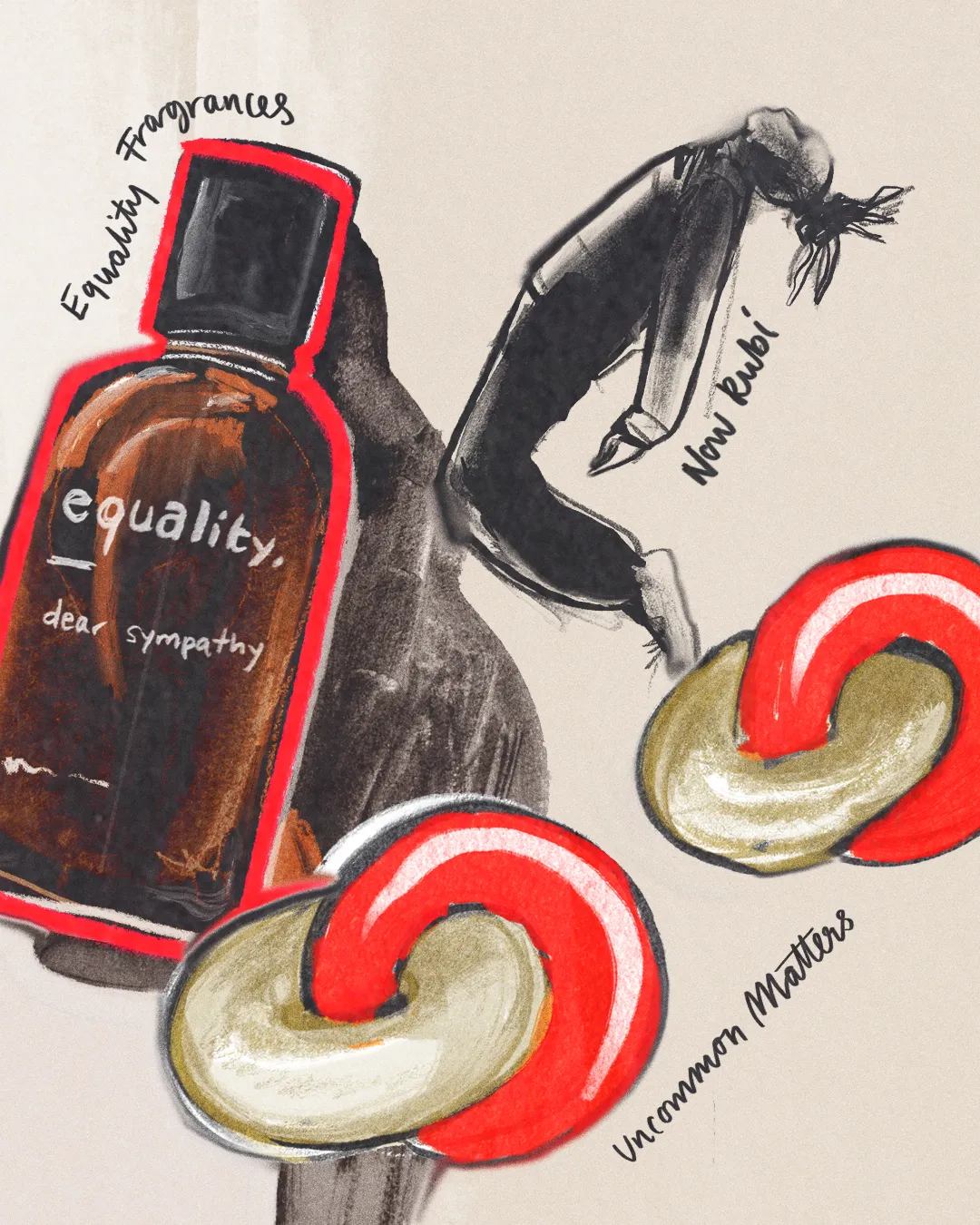STYLE
Publié le
Tuesday, August 27th 2024
What is the first thing that comes to mind when you think about German design? Probably, functionality and good cars. Well, it’s different now, and German creative consultant and fashion insider Julian Daynov is here to show you the new wave of local creative talents in fashion, interior, beauty, jewellery and lifestyle. His project Neudeutsch (or “New German”) is living proof that his country is going through a cultural shift and a creative renaissance. S-quive had a chat with Julian in Copenhagen, where he curated a selection of 33 avant-garde brands for the Copenhagen International Fashion Fair (CIFF) and became one of the highlights of the local fashion week.

Tell us more about the Neudeutsch project. How did it start?
Here, in Copenhagen, we present the second edition of the Neudeutsch project. The first one was at Pitti Uomo men’s fair in Florence in January. It all started with my idea to curate a project dedicated to German design and start a global media conversation, which shows that German design transcended what it has been known for. Somehow German design is considered one-directional, functional, pragmatic, and very engineering-based. As if there was never any boldness to it. Through my jobs in buying, retail, fashion and creative direction, I got a lot of touch points with new brands. And I saw that there is such an exciting shift happening, that has to be captivated and showcased somewhere internationally so people could get another idea of Neudeutsch as what it stands for, what it means. The German design has changed, and this is the change I want to show.

Where does this new wave of German designers come from?
Germany as a whole, and its big metropolitan cities such as Berlin, Munich, Cologne, Stuttgart, Hamburg, Dusseldorf, and Frankfurt turned into melting pots of different cultures about 8 or 10 years ago. The whole design language of Germany is changing, all these new people contribute their origins, and their inspiration to changing the perception of German design. This is why I named the project Neudeutsch - or “New Germany” - because there are a lot of international creative talents that have been living in Germany for the last ten, twenty or thirty years, and identify themselves as German. A lot of them come from New York or London and find their creative base in Berlin. They find it affordable and approachable. Also, Berlin has a great international network and a great cultural scene for inspiration. And so are the other cities in Germany.
“I believe in enabling culture. This is my favourite reason to work, if you have a network, use it for something fruitful, give chances and open doors, but never expect anything back.”
How is everything organised? How did you fund the project?
It’s a charity project, where I want to generate exposure for brands from Germany. It’s nice to have a partner like CIFF (Copenhagen International Fashion Fair) who can afford the rest that I couldn’t give to the brands. The CIFF gives us the space for free, they are hosting us, covering travel expenses, and taking care of the set-up that I imagined for the project. They helped a lot in the production process, they found the right people. I am happy to see that the designers enjoy being here, a lot of them otherwise would not be able to afford to participate in this kind of fair. It gives them exposure, they encounter journalists, buyers, and other brands. Some of them later team up. For example, some of the brands that participated in the first Neudeutsch project in Florence discovered each other at the fair, and are now doing collaborations together. I believe in enabling culture. This is my favourite reason to work, if you have a network, use it for something fruitful, give chances and open doors, but never expect anything back. This is a kind of help that I didn’t necessarily have at the beginning of my career.

In which ways this Neudeutsch CIFF selection is different from your Pitti project?
What you saw in January at Pitti was very menswear-driven, this is where the buyers go to see menswear brands, so they would expect menswear fashion. Here at CIFF, there are a couple of menswear brands too, but there are also those who create gender-neutral fashion. In Copenhagen, the selection is more design-driven because the CIFF itself is not just an apparel fair, but a lifestyle fair. They have beauty products, they have interior selection and other categories. This is why when they asked me to curate a project, they said that they would be happy if there were more brands from other departments. We wanted to replicate the idea of a concept store, where you walk in and everything is shoppable and everything attracts you. Why? Because I am a firm believer that if you are interested in great fashion, you are also interested in great visual products, interiors, nice lamps, and good cosmetics.
How did you find yourself in fashion?
I was doing editorial jobs in styling for magazines. Then my career developed into buying and retail. I went through different chains in the fashion industry: production, manufacturing, trend-scouting and buying for different brands, boutiques and big stores, and developing collections for them. At the moment I am designing four collections for four different brands, and some of them exhibit at CIFF. At times my name is mentioned on the label and at times I work as a white-label designer.

Also, with this project, you became more visible to the outside world of fashion.
I don’t want to be exposed. But I had motivation. When somebody tells you that something is not cool, doesn’t have a future, or can’t work, but you believe in it because there is so much good substance in it, it triggers me. I want to show how it works. I was sure that there was a market for these brands. And now, everybody sees that it works. To be honest, I would not have started without the support of the Pitti Uomo teams, they were the ones who were always saying let’s do something together, they loved the idea. Now I am paying tribute to them, every single day.
“Unfortunately, fashion magazines are not as strong as before. Every single person, even my grandma, is consuming media in a very different way than she used to do it before.”
You mentioned that you started as an editor in a magazine, and today we are witnessing a downfall of the printed press. Would you say that the industry has changed since you started?
Unfortunately, fashion magazines are not as strong as before. Our consumption of media is completely different. We are so much more digital. Every single person, even my grandma, is consuming media in a very different way than she used to do it before. So this is why it is changing our perception of the media. But it’s still a good starting point for young professionals to have a touch point with fashion, beauty or creative direction. Most of the people around me have all started in magazines and publishing.
%2520and%2520Julian%2520Daynov%2520.webp)
How did you scout the talents?
It’s the bubble I live in. I always have a lot of encounters with young designers, I also teach at the university, so I follow their careers. I see them evolve into brands and companies. Sometimes I wear some of their works or send them to celebrity stylists I am friends with. As I believe in enabling things and opening doors, a lot of them come up to me to ask if I know someone interested in a project, and I would put them in contact with the right person by email and say: “Go for it!”
What were your criteria when you selected the brands for Neudeutsch?
I wanted them to be contemporary and have a signature identity. It’s about newness, modernity, personal design language and distinct aesthetics, but also about what’s viable, scalable and would sustain and grow in a retail landscape. Also, I always have a look at their sustainability vision, all of them work with local suppliers, and most of them produce in Germany.

Is it your first time in Copenhagen?
No, I used to study Communications and Brand strategy here, and now sometimes I give lectures in local schools. This is why I come to Copenhagen quite a lot. I love the city, and I am friends with the CIFF team. So when we talked with Sophie (Sophie Dolva, CIFF President) about the project, we thought to ourselves, that’s going to be a great project, but very fun too!
“For me, fashion is about liberation.”
How would you define German style today?
The German style is definitely functional. It’s also changing with the new generations of Germans who love to be a bit bolder, a bit louder in their style, and more particular in their fashion choices, and because of globalisation and the opening of markets, they have access to so much international exposure that they can adapt something for themselves. For me, fashion is about liberation. Fortunately, in Germany there is an acceptance towards what you wear, so you can play with your style every day.

You mentioned a bunch of fashion cities in Germany. Why do you think there are so many centres of fashion?
In other countries, people go to the capital because they lack something in their towns, or they want openness and liberation. Whereas in Germany all of these cities attract people from the area. Nothing is centralised, and it’s developed in many areas. People are not lacking much. In Germany, there are also incredible concept stores, ones of the best in the world spread all around the country: Woo Store or Andreas Murkudis in Berlin, Marion Heinrich in Munich, Apropos in Hamburg, Hayashi in Frankfurt, Jades in Dusseldorf and many more. And let’s not forget, that Germany is a huge contributor to fashion consumption, it’s a buying population that loves to consume fashion and beauty. They are not the early adopters, but since the population is big it’s an interesting market for everyone.
What would you love to escape in life?
I want to escape from unacceptance, intolerance and prejudgments. I believe in enabling people and giving them chances. You can always change your impression but don’t be intolerant or into prejudgements, just accept peoples’ choices and ideas.
Plus d'articles